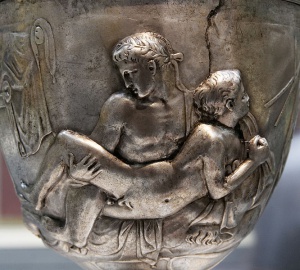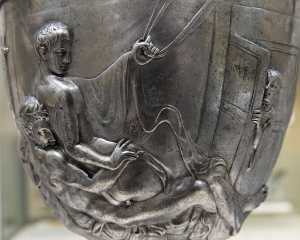(Boylove Documentary Sourcebook) - The Age Range for Young Male Beloveds as Given in a Poem by Strato: Difference between revisions
From BoyWiki
Dandelion moved page (BLSB) - The Age Range for the Younger Partner in a Pederastic Relationship as Given in a Poem by Strato to The Age Range for the Younger Partner in a Pederastic Relationship as Given in a Poem by Strato |
Replaced the redirect code with the new content of the page |
||
| Line 1: | Line 1: | ||
# | [[File:Warren Cup Scene B 20thCentury london British Museum.jpg|thumb|center|[[Warren Cup]]. A beardless youth engaging in [[Anal_intercourse|anal sex]] with a boy. Roman silver goblet with relief decoration, ca. 15 BC–15 AD. Said to be from Bittir (ancient Bethther), near Jerusalem. London, British Museum, 1999,0426.1.]] | ||
From <i>Homosexuality in [[Ancient Greece|Greece]] and [[Ancient Rome|Rome]]: A Sourcebook of Basic Documents</i>, edited by Thomas K. Hubbard (Berkeley: University of California Press, 2003). Footnote omitted. | |||
<div style="margin:.5em auto; width:95%; min-height:5em; background-color:#F5FAFF; border:3px solid #c9c9ff; padding:1em;"> | |||
<div style="font-size:92% "> | |||
<i>[[Straton of Sardis|Strato]] wrote during the time of the Roman emperor [[Hadrian]] (117–38 C.E.) and compiled a collection of his own and earlier poets’ [[Pederasty in ancient Greece|pederastic]] epigrams.</i> | |||
</div> | |||
[...] | |||
<center><b>6.60</b> Strato, <i>AP</i> 12.4</center> | |||
I delight in the prime of a twelve-year-old,<br> | |||
But thirteen is more desirable than this.<br> | |||
He who masters twice seven has a sweeter flower of Love;<br> | |||
The one beginning thrice five is more delightful still.<br> | |||
The sixteenth is the year of the gods; the seventeenth<br> | |||
Is not for me to seek, but for [[Zeus (mythology)|Zeus]].<br> | |||
But if one has desire for those yet older, no longer does he play,<br> | |||
But he now seeks the one “answering him back.” | |||
</div> | |||
[[File:Warren Cup Scene A 20thCentury london British Museum.jpg|thumb|center|Warren Cup. A bearded man engaging in anal sex with a beardless youth. Roman silver goblet with relief decoration, ca. 15 BC–15 AD. Said to be from Bittir (ancient Bethther), near Jerusalem. London, British Museum, 1999,0426.1.]] | |||
==See also== | |||
*[[Catamite]] | |||
*[[Ephebophilia]] | |||
*[[Erastes]] | |||
*[[Eromenos]] | |||
*[[Greek love]] | |||
*[[Historical boylove relationships in ancient Greece]] | |||
*[[Historical boylove relationships in ancient Rome]] | |||
*[[Philosophy of ancient Greek pederasty]] | |||
==External Links== | |||
*[https://greek-love.com/antiquity/greek-practices/pursuit-and-flight-by-sir-kenneth-dover <i>PURSUIT AND FLIGHT</i> BY SIR KENNETH DOVER (Greek Love Through the Ages)] | |||
*[https://greek-love.com/antiquity/greek-practices/greeks-pedicate-loved-boys-pederasty DID THE GREEKS PEDICATE THEIR LOVED BOYS? (Greek Love Through the Ages)] | |||
[[Category:Boylove Sourcebook]] | |||
[[Category:Reference material on ancient Greece]] | |||
[[Category:Reference material on ancient Rome]] | |||
[[Category:Greek literature]] | |||
[[Category:Boylove in literature]] | |||
[[Category:Poetry]] | |||
Revision as of 02:29, 21 August 2019

From Homosexuality in Greece and Rome: A Sourcebook of Basic Documents, edited by Thomas K. Hubbard (Berkeley: University of California Press, 2003). Footnote omitted.
Strato wrote during the time of the Roman emperor Hadrian (117–38 C.E.) and compiled a collection of his own and earlier poets’ pederastic epigrams.
[...]
I delight in the prime of a twelve-year-old,
But thirteen is more desirable than this.
He who masters twice seven has a sweeter flower of Love;
The one beginning thrice five is more delightful still.
The sixteenth is the year of the gods; the seventeenth
Is not for me to seek, but for Zeus.
But if one has desire for those yet older, no longer does he play,
But he now seeks the one “answering him back.”

See also
- Catamite
- Ephebophilia
- Erastes
- Eromenos
- Greek love
- Historical boylove relationships in ancient Greece
- Historical boylove relationships in ancient Rome
- Philosophy of ancient Greek pederasty